|
|
|
Sort Order |
|
|
|
Items / Page
|
|
|
|
|
|
|
| Srl | Item |
| 1 |
ID:
146875
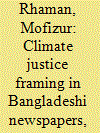

|
|
|
|
|
| Summary/Abstract |
Drawing upon the concepts of framing theory, this article explores, through close textual scrutiny, how two leading Bangladeshi newspapers have approached the issues of climate justice while covering three major climate summits, Bali 2007, Copenhagen 2009 and Durban 2011. The analysis reveals significant shifts in the treatment of issues related to climate justice by Bangladeshi journalists. Earlier coverage framed the problems mainly in terms of compensatory and distributive justice, but by 2011 disappointment, lost hopes and the need for activist movement are more prominent. The final analysis identifies important tensions between international developments and local engagement and perceptions, indicating that national and even local developments to address climate change problems in Bangladesh seem set to become more prominent news items in future.
|
|
|
|
|
|
|
|
|
|
|
|
|
|
|
|
| 2 |
ID:
146878
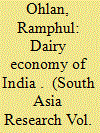

|
|
|
|
|
| Summary/Abstract |
India remains the world’s largest producer and consumer of milk. The present study empirically evaluates the transformations in demand and supply of dairy products in India, identifying that the share of dairy products in the food basket has significantly increased among both rural and urban consumers. While demand for dairy products is highly elastic and related to income, the analysis also shows large regional disparities in production and per capita availability of milk in India. After examining various aspects of dairy consumption and production patterns in India, the article also includes policy considerations to improve dairy production. It suggests that to stimulate dairy sector development and reduce inequality in dairy products consumption in India, milk and milk products should be included in the diet provided through the Midday Meal Schemes for primary education children. Overall, to meet the growing demand for dairy products, given their role in food security, the Government of India should continue to aim for sustained growth.
|
|
|
|
|
|
|
|
|
|
|
|
|
|
|
|
| 3 |
ID:
146879
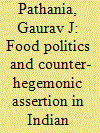

|
|
|
|
|
| Summary/Abstract |
Recently, heated debates concerning food politics have erupted at some of the most prestigious institutes of higher education in India. Students demand inclusion of beef and other meat in their hostel food menu, claiming hostel canteens represent only ‘mainstream’ Hindu culture. To boycott this culture and instil consciousness of their cosmopolitan life-world, they organise campus ‘Beef Festivals’ and publicly idolise so-called ‘demons’ of Hindu mythology. Using a Gramscian framework, this article explores the activism of marginalised students as counter-hegemonic and critically examines the ideological standpoints involved. As university spaces become significant sites to reinvent caste identities, we see that in their counter-hegemonic struggles, marginalised students employ the same tools and symbols of meat and myth as their opponents. It is argued that this strategy ultimately risks contradicting the goal of their activism and may block broader visions of an equal and just society.
|
|
|
|
|
|
|
|
|
|
|
|
|
|
|
|
| 4 |
ID:
146874


|
|
|
|
|
| Summary/Abstract |
Taslima Nasrin’s writings, which are extremely critical of Islam, have sparked controversy over the contents of her feminist work and strategy. Although many dismiss these writings as an anti-Islamic provocation, her ideas are well-received in the West, where she is celebrated as a feminist rebel who defies the supposedly suffocating Bangladeshi Islamic patriarchy. Unlike earlier Islamic feminists, especially Rokeya Sakhawat Hossain, who re-examined Islamic teachings in the light of locally prevalent gender discrimination, Nasrin directs her attacks against religion itself, putting almost the entire blame of gender injustice on it. In light of Rokeya’s work and strategy, and current struggles in Bangladesh to fine-tune the nation’s vision, the present article critically analyses Nasrin’s overly negative views of Islam and assesses the validity and efficacy of her feminist approach in Bangladesh society.
|
|
|
|
|
|
|
|
|
|
|
|
|
|
|
|
| 5 |
ID:
146873
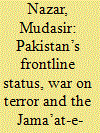

|
|
|
|
|
| Summary/Abstract |
How Islamic parties in South Asia respond to the global ‘War on Terror’ (WOT) and politicise related issues remains largely covered in press reports, which are often not in English. This article seeks to analyse the responses of one influential Pakistani Islamic party, Jama’at-e-Islami (JI), as a leading voice of protest. It provides evidence that engagement with WOT has reactivated JI and has become a political commodity for Islamists in Pakistan, feeding hopes that they will play a larger role in future governments in Pakistan. However, there are also signs that such hopes will remain unrealistic if JI does not distance itself from extremism and curbs Islamists’ terrorist activities.
|
|
|
|
|
|
|
|
|
|
|
|
|
|
|
|
| 6 |
ID:
146877
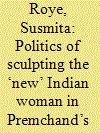

|
|
|
|
|
| Summary/Abstract |
This article focuses on two short stories by Munshi Premchand (1880–1936), a stalwart in modern Hindi literature. The aim is to counter the growing amnesia among the general readership about Premchand’s phenomenal contribution to India’s nationalist literature and to challenge the prevailing over-simplistic analysis of his depiction of Indian and Western womanhood. It is widely understood that Premchand, as a traditionalist and nationalist, eulogised Indian womanhood, often by denigrating Western women and their ideals. Re-examining the binary between the memsahib stereotype and the Indian woman (Bharatiya nari) image, this article takes an untrodden route. Casting new light on the text, it attempts to overturn the binary model that almost all critics so far have created about Premchand’s depiction of memsahibs versus Indian women.
|
|
|
|
|
|
|
|
|
|
|
|
|
|
|
|
| 7 |
ID:
146876
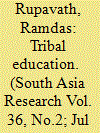

|
|
|
|
|
| Summary/Abstract |
This article critically examines initiatives for greater participation in education by tribal communities in India, arguing that current policy does not effectively enough facilitate greater participation and may, in fact, go against the avowed principle of ensuring greater equity. The article relies on fieldwork-based study to support arguments for the need to be culturally sensitive in making appropriate provisions for the education of scheduled tribes in India. Reasons for high dropout rates and non-enrolment among tribal children are examined and some searching questions are asked about why so many tribal people dislike schools.
|
|
|
|
|
|
|
|
|
|
|
|
|
|
|
|
|
|
|
|
|